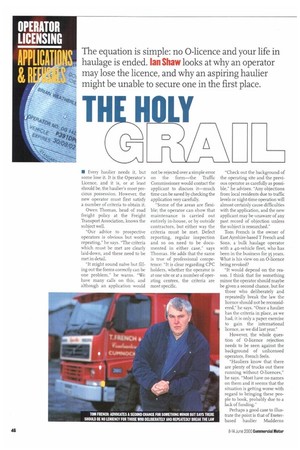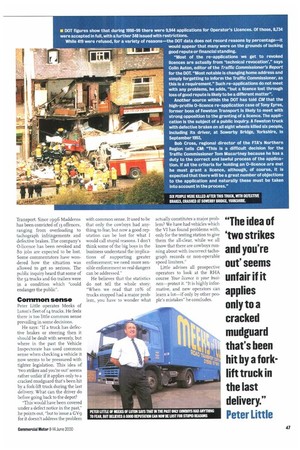The equation is simple: no 0-licence and your life in
Page 48

Page 49

If you've noticed an error in this article please click here to report it so we can fix it.
haulage is ended. Ian Shaw looks at why an operator may lose the licence, and why an aspiring haulier might be unable to secure one in the first place.
• Every haulier needs it, but some lose it. It is the Operator's Licence, and it is, or at least should be, the haulier's most precious possession. However, the new operator must first satisfy a number of criteria to obtain it.
Owen Thomas, head of road freight policy at the Freight Transport Association, knows the subject well, "Our advice to prospective operators is obvious but worth repeating," he says. "The criteria which must be met are clearly laid-down, and these need to be met in detail.
"It might sound naive but filling out the forms correctly can be one problem," he warns. "We have many calls on this, and although an application would not be rejected over a simple error on the form—the Traffic Commissioner would contact the applicant to discuss it—much time can be saved by checking the application very carefully.
"Some of the areas are flexible; the operator can show that maintenance is carried out entirely in-house, or by outside contractors, but either way the criteria must be met. Defect reporting, regular inspection and so on need to be documented in either case," says Thomas. He adds that the same is true of professional competence: "It is clear regarding CPC holders, whether the operator is at one site or at a number of operating centres, the criteria are most specific. "Check out the background of the operating site and the previous operator as carefully as possible," he advises. "Any objections from local residents due to traffic levels or night-time operation will almost certainly cause difficulties with the application, and the new applicant may be unaware of any past record of objection unless the subject is researched."
Tom French is the owner of East Ayrshire-based T French and Sons, a bulk haulage operator with a 40-vehicle fleet, who has been in the business for 35 years. What is his view on an 0-licence being revoked?
"It would depend on the reason. I think that for something minor the operator should maybe be given a second chance, but for those who deliberately and repeatedly break the law the licence should not be reconsidered," he says. "Once a haulier has the criteria in place, as we had, it is only a paper exercise to gain the international licence, as we did last year."
However, the whole question of 0-licence rejection needs to be seen against the background of unlicensed operators, French feels.
"Hauliers know that there are plenty of trucks out there running without 0-licences," he says. "Most have no names on them and it seems that the situation is getting worse with regard to bringing these people to book, probably due to a lack of funding."
Perhaps a good case to illustrate the point is that of Exeterbased haulier Madderns Transport. Since 1996 Madderns has been convicted of 13 offences, ranging from overloading to tachograph infringements and defective brakes. The company's 0-licence has been revoked and 8o jobs are expected to be lost. Some commentators have wondered how the situation was allowed to get so serious. The public inquiry heard that some of the 52 trucks and Go trailers were in a condition which "could endanger the public".
Common sense
Peter Little operates Meeks of Luton's fleet of 4 trucks. He feels there is too little common sense prevailing in some decisions.
He says: "If a truck has defective brakes or steering then it should be dealt with severely, but where in the past the Vehicle Inspectorate has used common sense when checking a vehicle it now seems to be pressured with tighter legislation. This idea of 'two strikes and you're out' seems rather unfair if it applies only to a cracked mudguard that's been hit by a fork-lift truck during the last delivery What can the driver do before going back to the depot?
"This would have been covered under a defect notice in the past," he points out, "but to issue a GV9 for it doesn't address the problem with common sense. It used to be that only the cowboys had anything to fear, but now a good reputation can be lost for what I would call stupid reasons. I don't think some of the big boys in the business understand the implications of supporting greater enforcement; we need more sensible enforcement so real dangers can be addressed."
He believes that the statistics do not tell the whole story: "When we read that ro% of trucks stopped had a major problem, you have to wonder what
actually constitutes a major problem? We have had vehicles which the VI has found problems with, only for the testing station to give them the all-clear, while we all know that there are cowboys running about with incorrect tachograph records or non-operable speed limiters."
Little advises all prospective operators to look at the RHA course Your licence is your business—protect it. "It is highly informative, and new operators can learn a lot—if only by other people's mistakes" he concludes.












































































































